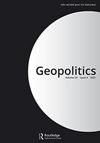难民返回、重返社会和可持续的未来:政治、陷阱和冲突后局势中遣返的可能性
IF 3
1区 社会学
Q1 GEOGRAPHY
引用次数: 0
摘要
摘要由于冲突和流离失所是我们这个时代最紧迫的问题之一,难民遣返和重返社会是冲突后发展与持久和平不可或缺的组成部分。联合国认为遣返是一个持久的解决方案,鉴于流离失所人数增加和国家对寻求庇护者政策严格的全球形势,遣返已被视为最可行的选择。这些现实也导致了从自愿原则向强调安全和人道主义议程政治化的务实转变,这破坏了难民保护制度的基本原则。本文借鉴1992-93年柬埔寨难民遣返的经验、最近从泰国遣返的缅甸难民1以及其他遣返案例的见解,探讨了政治解决后东南亚难民遣返的政治、陷阱和可能性,政治和其他紧急情况,而不是恢复和平与稳定。在关注难民、难民原籍国和接收国以及联合国难民署之间的关系时,它强调了阻碍难民返回的困境、矛盾心理和解雇。它质疑在选择受限的情况下的自愿,以及在脆弱和平的情况下安全和有尊严的返回、公民身份和归属的概念。它还反思了难民重新越境时身份变化对问责制的界定,并主张将遣返和重新融合视为一个连续体,并将可持续性和恢复难民未来性放在回归的讨论中。本文章由计算机程序翻译,如有差异,请以英文原文为准。
Refugee Return, Reintegration, and Sustainable Futurity: Politics, Pitfalls and Possibilities of Repatriation in Post/Conflict Situations
ABSTRACT With conflict and displacement among the most pressing issues of our time, refugee repatriation and reintegration are integral to post-conflict development and enduring peace. Regarded by the UN as a durable solution, repatriation has come to be viewed as the most viable option given the prevailing global landscape of increased displacement and stringency of national policies towards asylum seekers. These realities have also engendered a pragmatic turn from the principle of voluntariness to an emphasis on safety and the politicisation of the humanitarian agenda that destabilise the foundational principles of the refugee protection regime. Drawing upon the experiences of the Cambodian refugee repatriation in 1992–93, the more recent repatriation of Burmese refugees1 from Thailand and insights from other instances of return, this paper examines the politics, pitfalls, and possibilities of Southeast Asian refugee repatriation following political settlements, prompted as they were by political and other exigencies rather than the restoration of peace and stability. With attention to the relationships between refugees, refugee originating and receiving countries, and the UNHCR, it underscores the predicament, ambivalence, and dismissal that undergird refugee return. It interrogates notions of voluntariness in the context of constrained choice, and of safe and dignified return, citizenship, and belonging in the context of fragile peace. It also reflects on the delimitation of accountability by the changing status of refugees when they re-crossed the border and argues for looking at repatriation and re-integration as a continuum, and for centering sustainability and the restoration of refugee futurity in the discourse of return.
求助全文
通过发布文献求助,成功后即可免费获取论文全文。
去求助
来源期刊

Geopolitics
Multiple-
CiteScore
7.60
自引率
10.30%
发文量
50
期刊介绍:
The study of geopolitics has undergone a major renaissance during the past decade. Addressing a gap in the published periodical literature, this journal seeks to explore the theoretical implications of contemporary geopolitics and geopolitical change with particular reference to territorial problems and issues of state sovereignty . Multidisciplinary in its scope, Geopolitics includes all aspects of the social sciences with particular emphasis on political geography, international relations, the territorial aspects of political science and international law. The journal seeks to maintain a healthy balance between systemic and regional analysis.
 求助内容:
求助内容: 应助结果提醒方式:
应助结果提醒方式:


